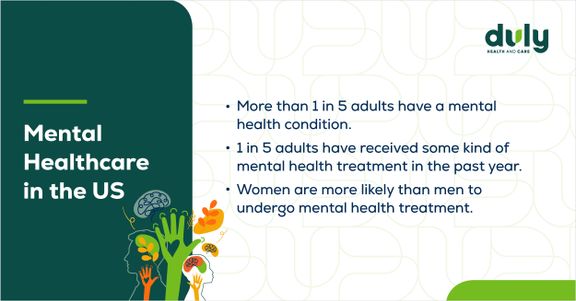Choosing a mental health provider is about establishing a new relationship – one that can help you navigate the ups and downs of life, both now and in the future. It is important that you feel comfortable and supported by your mental health provider, and that you share a similar perspective regarding approach to care.
When it comes to selecting a mental health provider, you have options. There are a range of professionals trained in diagnosing and treating mental health conditions common among adults in the US.

Taking care of your mental health is investing in your overall wellness, and it can change the course of your life for the better. If you’re looking to find a provider to support your mental health, you need to know who’s who in mental health and how to choose the best provider to fit your needs.
Psychiatrists
A psychiatrist is a physician (that is, someone who has a MD or DO degree) who is specially trained in mental health. They may also specialize further, such as in psychiatry for children and adolescents, or people experiencing addiction. Psychiatrists diagnose and treat mental health conditions, often through providing medication-based interventions.
Psychiatrists may also work closely with physician assistants (PAs), nurse practitioners (NPs), and/or advance practice nurses (APNs) in providing psychiatric care for patients with mental illnesses. You may work directly with a PA, NP, or APN in managing your psychiatric care.
Clinical and Counseling Psychologists
Clinical and counseling psychologists are doctors (that is, someone who has a PhD or PsyD degree) trained in psychology, a branch of science that focuses on thoughts, behaviors, and emotions.
To diagnose and treat mental health conditions, psychologists use talk therapy (also known as psychotherapy) to help people identify and understand their emotions, behaviors, and thoughts, and learn new skills for coping with difficult experiences. Some psychologists specialize in special kinds of therapy, such as cognitive behavioral therapy (CBT), dialectical behavior therapy (DBT), and acceptance and commitment therapy (ACT). Psychologists aren’t usually licensed to prescribe medication, but they often work with other prescribing providers.
Neuropsychologists
Neuropsychologists are clinical psychologists (that is, PhD or PsyD degree) who have further specialized in understanding the relationship between the brain and behavior. Neuropsychologists conduct comprehensive assessments of an individual’s cognitive and emotional functioning to help with diagnosis and guiding treatment plans.
Your mental health provider or doctor may refer you for a neuropsychological assessment if they feel it would be helpful for your overall care. It is often the case that you would be referred to a neuropsychologist for just a couple of visits to complete an evaluation, and it would not take the place of continuing care with your other established mental health providers.
Health Psychologists
Health psychologists are doctors (PhD or PsyD degree) who specialize in understanding how the mind and body interact to affect our overall health and wellness. They work with patients to understand how psychological factors can influence physical health and illness and vice versa. They often provide assessment and therapeutic intervention for individuals with co-occurring physical and mental health conditions to improve healthcare outcomes.
Counselors and Therapists
Counselors and therapists usually have at least a master’s degree in psychology, counseling, or another related field. The title they use often depends on where they are providing treatment, their specific degree, or their personal preference.
Trained to evaluate people’s mental health, help patients navigate symptom management, and promote healthier ways to live, counselors and therapists treat a range of mental health conditions. Counselors and therapists aren’t licensed to prescribe medication, however, they usually work with other providers who do.
Clinical Social Workers
Licensed clinical social workers (LCSW) have at least a master’s degree in social work, and some have a doctorate. They assess and provide treatment for a range of mental health conditions.
They’re also specially trained in case management (planning for and monitoring of different social and healthcare services for a client) and advocating for their patients. Clinical social workers can’t prescribe medication, but they can work with a prescribing provider to do so, if needed.
Are you ready to put your mental health first? Make an appointment with a Duly Behavioral and Mental Health provider today.
Other Types of Mental Health Professionals
The list of mental health professionals does not end there. Some other healthcare professionals that provide mental health care include:
- Primary care providers
- Family nurse practitioners
- Pastoral counselors (clergy members trained to provide counseling)
- Certified alcohol and drug abuse counselors
- Peer specialists (mental health providers who have personal experience with conditions related to mental health or substance use)
Deciding Which Mental Health Provider is Right for You
Understanding the types of mental health providers is just the first step. When you make the crucial decision to begin mental health treatment, you’ll need to consider your individual needs and what type of provider may be right for you.
Start with identifying your primary concerns. Mental health professionals are trained to treat most mental health concerns. However, some providers have special training or experience in certain areas, such as eating disorders, marital problems, or grief and loss. Providers may also specialize in an age group, such as adolescents or older individuals. Others are trained to provide compassionate and knowledgeable care for specific populations, such as the LGBTQ+ community.
You may also want to consider whether you would like to discuss medication options to help manage your mental health. Keep in mind – if you see a provider who isn’t licensed to prescribe medication and you end up needing medications, they will work with a prescribing provider as part of your care team to meet your needs.
Don’t forget to review your health insurance coverage. Some insurance plans only cover visits with specific types of mental health providers, or they place a limit on the number of visits you can have during a coverage year.
Once you find a provider you’re interested in, make an appointment to get to know them. If you don’t think they’re a good fit, don’t hesitate to reach out to another provider. It’s important to feel comfortable with your provider so you can work collaboratively toward your treatment goals.
Choosing a mental healthcare provider is a big decision and may seem like a daunting one. However, there’s truth to the proverb, “a journey of a thousand miles begins with a single step.” Make that single step for yourself and reach out to make an appointment with a provider you think may be a good fit for you.
Health Topics:








